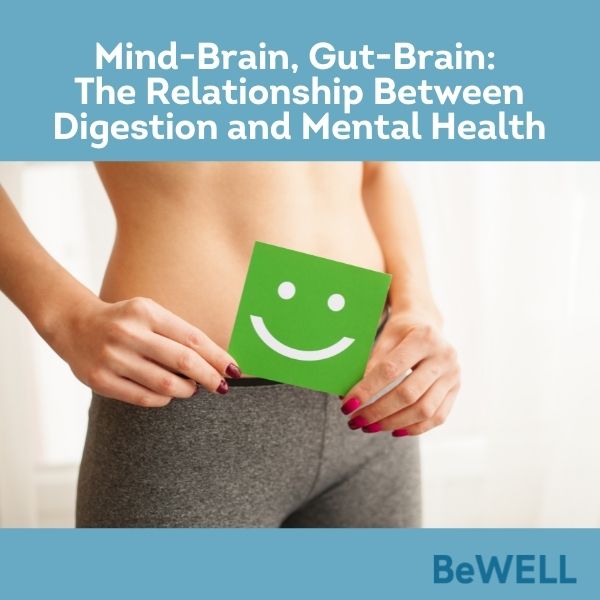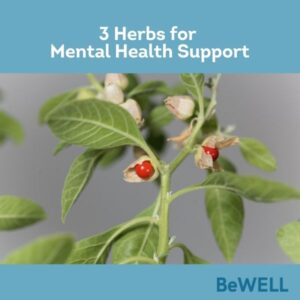By Jennifer Kurdyla
The part of the body most associated with mental health is our head. Between crown and chin is a whole universe of thoughts, emotions, beliefs, and sensory information that create our sense of the world and our place in it. And at its center is that dense, wrinkly mass of cells called the brain, orchestrating not only these more subjective and abstract elements of our mind but also a slew of physiological processes that keep us alive from the chin down.
Traditional therapy, and even complementary therapies like yoga and meditation, will often emphasize the chin-up job of the mind—talking about memories or experiences, or “stilling” the nonstop flow of thoughts as we do in mindfulness practices. But separating these two jobs of our brain—maintaining our body and maintaining our mind—can prevent us from recruiting one of the most powerful tools we have in balancing mental health. It’s also a brain, but located in the below-the-chin region of the body. And it’s called your gut.
More than just the place your food goes after you swallow, the gut is the home of its very own brain called the enteric nervous system that works both with and separately from the central nervous system with an HQ in your skull-brain. Thanks to a colony of bacteria collectively known as the gut microbiome, as well as a sophisticated anatomical design in the pelvic region that allows for messages to move between you and the environment, our guts not only play a role in regulating, but actually create, things like our mood, emotions, and reactions to stress. You might have used the phrase “gut feeling” before to describe an intuitive knowing about a situation your brain couldn’t explain by logic. That feeling is real, and offers us a whole new toolkit for working with mental health imbalances through the gut brain, and namely through digestion.
Brain Wave: Digestion Meets Mental Health
In my book Root & Nourish, my coauthor Abbey Rodriguez and I explain the way food, like a good conductor, can help to harmonize all the various systems of the body so each distinct melody combines into a beautiful piece of music called your health. Using our backgrounds in the holistic traditions of Western herbalism and Ayurveda, we offer over 100 recipes that support digestion, mental health, and female reproductive hormonal health, separately and together. The idea is this: When our digestive fire, known as agni in Ayurveda, is working well, burning at a steady pace such that we get hungry for our meals, we know when we’re full, and completely break down our food into what we want to keep as nutrients and eliminate what we don’t want to keep, the enteric nervous system stays happy and balanced. Our gut brain sends clear messages to our head brain about how we feel—all feelings, not just good ones—and because our bodies are well fed, our brain can make sense of those feelings rationally and take appropriate action.
When that system is disrupted, however, impaired digestion will not allow for clear communication between mind and gut. If the body’s spending lots of energy trying to break down food, there’s less to support clear cognition—from everyday decisions like what to eat to more complicated tasks like our work. We may feel disoriented or easily distracted, cloudy and slow in our thinking (brain fog), anxious, depressed, or a host of other metal imbalances.
Since the mind-gut connection is a two-way street, the mind itself can contribute to digestive imbalances, which then impact the mind again (recognize a pattern?). The primary cause of this loop in either direction is our dear friend, stress. When we’re fielding “urgent” emails 24⁄7, trying to care for children, doing the work-life-exercise-relationships dance, and eating everything else on our plates, the sympathetic nervous system (fight or flight) in our mind flips on to keep us safe from those perceived dangers.
You might be familiar with some of the common stress-related symptoms: irregular energy levels and mood, insomnia, fatigue, anxiety and/or depression (they’re two sides of the same coin, so if you’ve felt both, you’re not alone!), trouble relating to others, lack of focus, and brain fog, among others. They’re the result of our bodies being flooded with stress hormones needed to help us to run away from the threat at hand—maybe a bear, or our devices—since it’s crucial in a moment of real danger to have our blood pumping, our muscles ready to work, and our senses laser-focused.
The thing is, the stress response is only meant to stay on for a short period of time. Yet in our modern world, stress lingers in our bodies far longer than it needs to because of our constant state of stimulation. The longer we remain in a state of stress, the more susceptible we are to getting sick in body, mind, and spirit. Because when the sympathetic nervous system is turned on, its opposite partner, the parasympathetic nervous system—responsible for our bodies’ rest and digest functions—gets turned off. The longer we go without digesting what we eat or feel, the fewer nutrients get to our brains, making it hard to maintain balanced thoughts, emotions, and reactions. Go a little longer, and we start to see this cycle penetrate even deeper into our reproductive hormones.
Now, the obvious solution to all this is avoiding and eliminating stress. But stress is an inevitable part of being human, and in today’s society it’s impossible to avoid anxiety altogether. A modest amount of stress, called eustress, is actually good for us, since we need a bit of discomfort, challenge, and urgency in order to get anything done and evolve as individuals. Think about the last time you had to give a presentation or do anything public (social media counts, too)—did you get nervous? Hands a little sweaty? Some butterflies in your belly? That was stress, and a sign that you cared about what you were doing. In fact, the whole reason we wake up in the morning is because our bodies naturally produce a spike in the stress hormone cortisol. In time, our sources of stress (good or less good) can even become outlets for healing and growth. Still, it’s distress (that’s the bad kind of stress), or chronic stress, that we need to look out for.
Rituals for Healthy Mind-Body Eating
Ayurveda recommends several ways to realign the mind- and gut-brains such that the highway of information between them isn’t in a traffic jam of stress. Consider these rituals around your meals to help reorient your energy toward digestion, and support the relaxation response so your body and mind feel alert, energized, and vibrant every day and every season.
- Create a container around mealtimes: When we multitask while eating, the “fire” that belongs in our gut gets pulled out toward our senses at the periphery, reducing our digestive capacity. Taking 15 to 20 minutes out of your day to eat a meal without distraction protects that digestive fire and allows for a more complete transformation of your food into energy, so you can return to your tasks feeling full and focused.
- Cook your own food: Engaging with your food not only allows you to receive its energetic nutrition, but it slows down the whole process of eating. You get to experience your food with all your senses, which in a way “pre-digests” your meal before you even put it in your mouth. Taking time to cook also allows a buffer between meals and other activities when your mind is focused on one thing, building up your single-tasking muscles that will reduce feelings of overwhelm and anxiety elsewhere in your life. Cooking your own meals will also help you know what you’re eating with more certainty, and choose more seasonal, local, and fresh foods that naturally provide better nutrition. Try to prepare at least one meal a day, or meal prep several meals in advance.
- Simplify your meals: Many of us have a “salad bar” mentality when it comes to our meals–the more components and ingredients, the better it will be! This “more is better” attitude actually creates a whole lot of confusion, and more work, for the digestive system, like when your computer has too many windows and tabs open and the whole thing freezes. Give your gut a break by simplifying the contents of your meals. Choose 2 or 3 main ingredients (like a grain and 2 veggies), some fresh herbs or spices, and a fat, and use that as a template for your meals. This will not only make meal planning easier, but it will give your gut less information to have to break down and prevent the build-up of metabolic waste that, per Ayurveda, can result in brain fog, anxiety, depression, and a general “icky” feeling. Plus, you can better taste the individual ingredients, which can help you reconnect with those foods, like meeting old friends, and evaluate how they taste to you now, rather than your idea of what they should or used to taste like.
Get more tips and recipes about digestive, mental, and hormonal health (and the dance they do together!) in Root & Nourish: An Herbal Cookbook for Women’s Wellness and at jenniferkurdyla.com.



